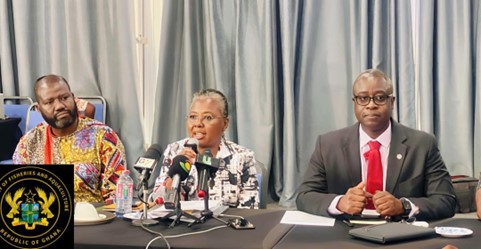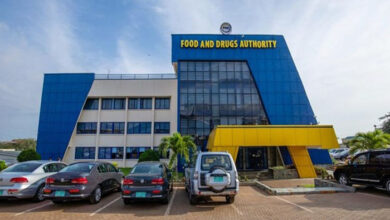
Ghana is actively preparing a revised fisheries law aimed at modernizing the sector and aligning it with global best practices. This crucial legislative effort is hoped to lead to the lifting of a five-year-old “yellow card” sanction from the European Union (EU) related to illegal fishing.
Mrs. Emelia Arthur, Minister for Fisheries and Aquaculture, stated that the new legislation is a vital component of Ghana’s broader strategy to develop its blue economy, while simultaneously addressing existing weaknesses in monitoring and enforcement within the sector.
The new bill, she explained, will bring Ghana’s regulatory framework in line with international standards and is designed to decisively tackle the challenges highlighted by the EU. Ghana received the “yellow card” warning from the EU in 2019 due to concerns over illegal, unreported, and unregulated (IUU) fishing. This warning has since restricted Ghana’s access to the EU seafood market, putting pressure on local fishers and exporters.
Speaking on the sidelines of a stakeholder consultative meeting in Accra, Mrs. Arthur emphasized the urgency: “We need to work to immediately get the yellow card lifted, otherwise we risk getting a red card; which means fish from Ghana cannot be exported to the EU market that happens to be the largest market for the fisheries sector.”
She noted that the revised bill is expected to tighten controls on fishing vessels, improve data reporting, and strengthen penalties for non-compliance. It will also include provisions for sustainable stock management and enhanced protection of marine ecosystems.
Ghana’s fisheries sector is a significant contributor to the national economy, supplying 60 percent of animal protein and supporting nearly 3 million jobs across its value chain. However, challenges such as illegal industrial trawling, weak enforcement, and dwindling fish stocks have severely impacted many coastal communities.
The Minister confirmed that major progress has been made in finalizing the Draft Fisheries and Aquaculture Bill, which was not initially passed by the 8th Parliament. She also unveiled a revised vision for the sector: “A sustainable, well-governed and resilient fisheries and aquaculture sector driven by equity, innovation and strategic investment.” She stressed that the new bill will align with this vision, ensuring food security, economic growth, and environmental stewardship while positioning Ghana as a leader in the blue economy.
Mrs. Arthur added that an independent review by a Ghanaian Fisheries Law professor based in Australia will provide final recommendations before parliamentary approval. The Minister expressed optimism that Ghana could showcase its progress at the upcoming United Nations Oceans Conference. She noted that with parliamentary processes advancing, the bill is expected to undergo clause-by-clause consideration before its passage.
Dr. Godfred Seidu Jasaw, Chairman of the Parliamentary Select Committee on Food, Agriculture and Cocoa Affairs, also spoke at the stakeholder meeting, underscoring the importance of input from fisheries sector players in shaping the bill. “This meeting is particularly important because of where we are in the fisheries sub-sector. We must co-create solutions to manage this critical resource sustainably for the benefit of current and future generations,” he stated.
He commended stakeholders for their efforts in meeting international obligations and highlighted the sector’s crucial role in national food security. Dr. Jasaw acknowledged the ministry’s work in addressing the EU yellow card issue and called for collective ownership of the new legal framework. He explained that the draft bill, referred to Parliament after Cabinet approval, had undergone rigorous review by the committee. “We have made inputs we believe are satisfactory, but it is crucial that stakeholders validate these provisions,” he said, encouraging constructive feedback: “Lawmaking is a democratic process. Argue your case convincingly, and we will consider it.”
Dr. Jasaw lauded the minister for her hands-on involvement in the legislative process, calling it a “demonstration of commitment.” He urged continued collaboration to “reset Ghana’s fisheries sector for a better future.” Stakeholders at the meeting reviewed the latest draft, incorporating feedback from the EU, Food and Agriculture Organisation (FAO), and local experts.


